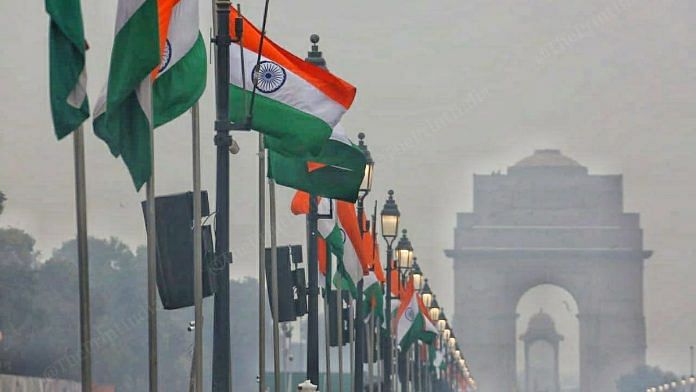Thank you dear subscribers, we are overwhelmed with your response.
Your Turn is a unique section from ThePrint featuring points of view from its subscribers. If you are a subscriber, have a point of view, please send it to us. If not, do subscribe here: https://theprint.in/subscribe/
No two cultures are the same, some are more stable and better for human flourishing than others. A culture which encourages human flourishing requires three things.
- A moralising force that establishes societal moral standards and prevents anarchy. Having moral standards that most people can internalise increases mutual trust. It leads to more trade and business collaborations. It also de-emphasises tribal vote-bank politics. Politicians are instead forced to compete on other things based on society’s philosophical leanings. By its definition, moralising force is collectivist in nature.
- A philosophising force that acts as an umbrella for new ideas, innovations and defines the purpose of life. Philosophising force allows for individualism. Without such a force, you get a stagnant society, unable to adapt to the changing world.
- A state to defend the society against internal and external threats and enforce contracts. Size of the state matters too. Too large a scale may lead it to fall apart. Too small a scale can make it un-competitive against other competing cultures. Right scale might vary throughout history, roughly based on the speed of propagation of ideas and logistics. Currently, somewhere between national and civilisational seems to be the right scale.
India’s philosophising force looks at the world as a place full of diversity, with underlying unity that connects them together. Hinduism is a result of that philosophical outlook. In ancient India’s context, Dharma provided the moralising force. Dharma talks about establishing morality based on the impact of the actions on sustainability of society and environment. In contrast to Abrahamic traditions, where the baseline was established in society via proselytisation, often accompanied by use of force, establishing the baseline of Dharma requires debates and discussions within the wider society. Dharma needs to be established again and again, to suit the new realities, as times change.
There is this notion among some people that religion somehow prevents economic development. Religion is not some narrow concept, but a collection of wide ranging ideas, and it’s unfair to treat it simplistically.
Economic growth cannot happen in chaotic societies. We need a moralising force to bring mutual trust within society allowing trade and business partnerships to happen. One function of religion is providing such a moral code, though a very powerful state can partly replace that need, if it can strongly enforce laws.
Once initial economic growth has started, further growth requires creativity and innovation. Philosophical aspects of religion can help in that process. They can provide inspiration, motivation and vision for new ideas. That said, if the religion is strict and lacks philosophical elements to support innovation and human flourishing, it can also stall the progress beyond a point.
I think you need a balance of both moralising and philosophising functions for a society to grow well for a long time. Religion can fulfil those roles, at least partly, if not all of them. If we take the example of Europe, Christianity provided the moralising function, but gradually weakened, giving way to the rediscovery of ancient Greek knowledge, which fulfilled the philosophising function. In the case of India, Hinduism has the capability to provide both functions. While Hinduism retains its philosophising function, it has weakened in its moralising abilities.
Besides religion, there are other ritualistic mechanisms of fulfilling the moralising function. Examples include: Industrialisation, Education, Military service on massive scales. All these lead to major shifts in how society thinks and organises itself — eventually leading to a set of shared ethics/moral code. In that sense an autocratic nation is faster in providing moralising force, however it lacks the philosophical force needed for innovation and sustaining longer term flourishing.
India’s bane has been a lack of a common societal moral standard, either through Dharma or through state sponsored means like industrialisation and education. Anything goes attitude causes us to tolerate things damaging to our society. Hinduism, in the name of diversity, sometimes ends up assimilating bad practices from society like casteism, appeasing Islamism and does not take a strong stand against them. We can maintain most of our diversity, but still aim to be united morality wise.
Note that constitutional laws created by the state can’t fully replace the need for such moral codes, they have to be rooted in its culture for them to be internalised. Mutual trust comes partly from state enforcing contracts and partly from social norms that most people are conditioned to follow.
In the 21st century, we now have the technology to travel quickly between different parts of the country, and digital means to communicate instantly. Even with the huge population we have, if we use these technologies innovatively, we can accelerate the nation/society building process, allowing Dharma to be established again.
These pieces are being published as they have been received – they have not been edited/fact-checked by ThePrint

